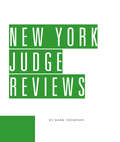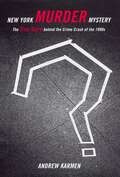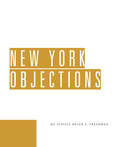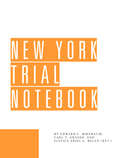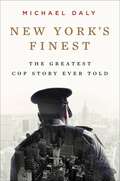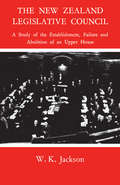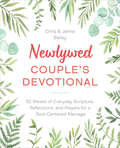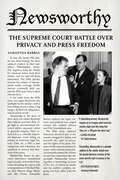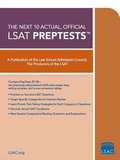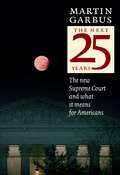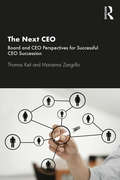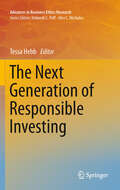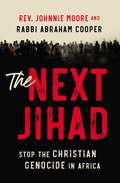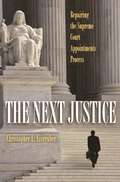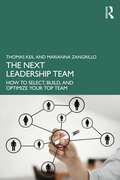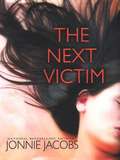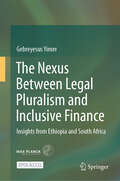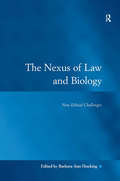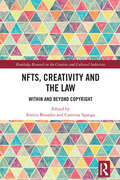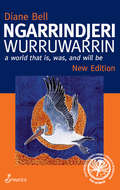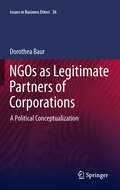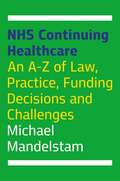- Table View
- List View
New York Judge Reviews and Court Directory
by Elizabeth Smith Mark ThompsonKnow Your Judge New York Judge Reviews contains attorneys' candid comments about the rules, preferences and idiosyncrasies of more than 300 sitting State Supreme Court Justices compiled from interviews with hundreds of litigators. Learn from other attorneys' experiences before your next appearance. Read their revealing quotes, which include: * "He's not a settler. His recommendations always lowball plaintiffs." * "He doesn't talk case law. He's more fact-oriented." An average of eight interviewees per State Supreme Court Judge were asked hard questions about judicial personality, intelligence, trial management, settlement skills, knowledge of the law, flexibility, bias, and more. The easy to read-and often entertaining-reviews of judges make this book a one-of-a-kind resource. Two sample reviews from the book (Judge names omitted): Temperament: "Cantankerous. Authoritarian. Overreacts." On the bench: "Bright, but he wastes his talent. Light on evidence." On trial: "Stickler for rules. Sua sponte objections." Adjournments: "Erratic." Proclivities: "He's very evenhanded." The book also includes biographical profiles on more than 350 judges set out in a clear, easy-to-read format with the latest information about each judge: * Personal history, including birth date, education, interests and activities * Memberships in organizations and awards * Political affiliation * Recent publications * Teaching and speaking engagements * Recent cases * Judge's own rules * Address and phone number, along with names of clerks and secretaries Recent and comprehensive information on county and state courts in New York, including the names, addresses, phone numbers, and fax numbers of county officers and personnel related to court functions, court officers and personnel, and an up-to-date roster of the judges with their phone numbers. The Judge reviews, Judge biographical information, and comprehensive court contact information make New York Judge Reviews an indispensable part of trial preparation that will help you: * Formulate case strategies * Unearth potential bias * Assess the court's flexibility * Determine case-specific knowledge * Uncover oral argument secrets * Make the difficult decision to disqualify an assigned judge
New York Murder Mystery: The True Story Behind the Crime Crash of the 1990s
by Andrew KarmenAndrew Karmen tracks a quarter century of murder in the city Americans have most commonly associated with rampant street crime. Providing both a local and a national context for New York's plunging crime rate, Karmen tests and debunks the many self-serving explanations for the decline. While crediting a more effective police force for its efforts, Karmen also emphasizes the decline of the crack epidemic, skyrocketing incarceration rates, favorable demographic trends, a healthy economy, an influx of hard working and law abiding immigrants, a rise in college enrollment, and an unexpected outbreak of improved behavior by young men growing up in poverty stricken neighborhoods. New York Murder Mystery is the most authoritative study to date of why crime rates rise and fall.
New York Objections: Trial Practice, Tips, and Cases
by Helen FreedmanSpecially Designed for Courtroom Use The latest Edition of New York Objections, by Associate Justice Helen E. Freedman, includes new andupdated text in 19 chapters and more than 100 new case blurbs. The new text and cases cover a wide array of topics, including objections related to: * Failure to set forth a claim during opening statement * Hearsay exceptions: Declarant must be unavailable -- former testimony * Hearsay exceptions: Declarant availability irrelevant * Excited utterance or spontaneous declaration * Cumulative evidence * Missing witness charge * Character evidence - prior uncharged crimes * Admissibility of photos of the accident scene in a civil case * Witness examination regarding prior bad acts * Expert testimony related to toxic substances; eyewitness identification; sexual abuse; and mental competency * Design and maintenance opinion evidence * Electronic evidence. Documents sent by or stored on social media sites, and communications made by cell phone or text, recently have been deemed admissible, under CPLR 4518(a), if they have the indicia of reliability. Winning at trial means getting your evidence in and keeping the opposition's evidence out -- or at least minimizing its impact. Most evidentiary rulings are within the judge's discretion, and are made in seconds. Bad rulings are almost never reversible. In sum, victory goes to the lawyer who can prevail on the big objections in the heat of battle. The key is knowing why, when and how to object and how to respond -- at a moment's notice -- with supporting authority at your fingertips. That's where Justice Freedman's New York Objections comes in. Like no other resource, New York Objections uses a courtroom-friendly format to cover more than 100 trial objections with clear, concise explanations, practice tips, and cautions -- plus the rules, statutes, and cases that comprise and construe New York's rules of evidence. Pattern Objections Comments Practice Tips & Cautions Cases Response Foundation Tactics * Preclude trial objections through motions in limine. * Evaluate the admissibility of the opposition's evidence. * Decide when to object, and when to remain silent. * Preserve the record for appeal. * Respond to objections -- on the spot, and with authority. * Draft briefs on evidentiary objections and motions. * Prevent jury exposure to adverse inadmissible evidence.
New York Search and Seizure
by Barry KaminsThis book is written for police officers, so it's a very practical approach to the law as it relates to police encounters. If you want to know what your rights are when stopped by the police or when the police come to your door, this is a good book to read.
New York State Driver's Manual 2016
by New York State Department of Motor VehiclesYou must have a valid driver license to drive legally in New York State. If you reside in and hold a valid license from another state or nation, you can drive legally in New York State. Even if you are licensed somewhere else, people under age 16 cannot drive in New York State.
New York Trial Notebook
by Ariel Belen Carl Grasso Edward BirnbaumNew York Trial Answer Book Techniques, law, and forms for trial preparation and presentation. The latest edition of New York Trial Notebook adds hundreds of new case citations, dozens of new tips, and many new and substantially revised sections. Turn to New York Trial Notebook for clear, concise explanations, practice tips, and recent case-based illustrations covering everything from preparing the case for trial through post trial motions. Lawyers no longer have as many opportunities to polish their trial skills. Small cases rarely reach courtrooms, and specialists and public defenders now handle the criminal cases that used to keep civil lawyers trial-ready. However, the procedures and cases governing New York courtrooms -- and the techniques that work in them -- must still be learned and remembered. Here is the solution. Courtroom veterans Ed Birnbaum, Carl Grasso, and Justice Ariel Belen have blended their hard-won trial lessons with the law and rules governing New York trials in an accessible single volume called New York Trial Notebook. This practical work is heavily-supported with 2,000 cases containing parenthetical descriptions and pinpoint citations, more than 80 forms in print and via Digital Access, and dozens of practice tips. New York Trial Notebook delivers: Expert witness disclosure Eve-of-trial preparation Expert witness testimony Jury selection Trial tips Cross examination of lay witnesses And much, much more. You'll receive detailed answers to the questions that frequently arise in the home stretch before trial, and that arise in the courtroom - qualification and cross-examination of experts, making and meeting objections, persuasive openings and closings, pretrial motions and motions during trial, jury selection and instruction.
New York's Finest: Stories of the NYPD and the Hero Cops Who Saved the City
by Michael DalyThe gritty, true blue story of two remarkable cops and an equally extraordinary nurse who provided the spirit and smarts that transformed Fear City into the safest big city in America.NEW YORK'S FINEST is the story of a city's transformation through the tireless efforts of Detective Steven McDonald, Nurse Justiniano, Jack Maple, and a host of hero cops—including the great niece of Jazz Age great Josephine Baker—the finest of The Finest. The son and grandson of cops, Officer McDonald was shot and paralyzed from the neck down while on patrol in 1986. The doctors said that if he did survive, he would be better off dead. It was then he came under the care of one Nurse Nina Justiniano. Where the teenage gunman was produced by the worst of Harlem's social ills, she personified its many graces, rescuing Steven from despair and urging him to transcend hate and bitterness.McDonald was then promoted to detective at the urging of NYPD Deputy Commissioner Jack Maple, a postal worker's son who sported a bow tie, Homburg hat, and two-tone shoes as he implemented transformative crime-fighting strategies to deter violent subway robberies. Coming up in the force, Maple had been routinely mocked for imagining the impossible: that Times Square would one day be a destination for families and tourists.Now, resentments and tensions are mounting in the same neighborhoods that most benefited from the careful consideration of officers like McDonald and Maple. But as NEW YORK'S FINEST illustrates, their legacies, and those of people like Nurse Justiniano, may well rescue New York City from its present state of unrest and struggle in the wake of protests and the pandemic.
The New Zealand Legislative Council: A Study of the Establishment, Failure and Abolition of an Upper House
by William JacksonThe New Zealand upper house, the Legislative Council (which bore a marked resemblance to its Canadian counterpart the Federal Senate) was abolished in 1950 in an action which represents one of the most clear-cut examples of pragmatic politics in New Zealand history. It was abolished by the essentially conservative National party (fundamentally committed to the bicameral principle), while the Labour party (formally committed to abolition) at first obstructed and then merely stood on the sidelines. New Zealand thus became the only democratic country in the world without either an upper house or a formal written constitution of any consequence. The author attempts both to explain this unusual development and to assess its consequences. The generally accepted view that the Legislative Council failed in 1892 is challenged, and the causes of the decline and failure are traced back to circumstances surrounding its original establishment in 1854. Subsequently, developments since 1950 are examined in the light of abolition. The author concludes that abolition represented the right policy undertaken for the wrong reasons and that ultimately it has made a greater contribution to constitutional change in the twenty years since 1950 than the chamber itself made in the last fifty years of its existence. The New Zealand Legislative Council, an analytical historical study of an institution, throws valuable light on the strengths and weaknesses of the bicameral principle and the consequences of abolishing a second chamber of Parliament. The book should prove useful to Political Science and History courses dealing with Commonwealth Parliamentary government, comparative institutions and constitutional law. It should also appeal to all those interested in the question of bicameral representation.
Newlywed Couple's Devotional: 52 Weeks of Everyday Scripture, Reflections, and Prayers for a God-Centered Marriage
by Chris Bailey Jamie Bailey52 Weeks of Newlywed Devotionals for Navigating a God-Centered MarriageMarriage is a journey of both hills and valleys, and newlyweds are just beginning this great adventure. By following God's way and making him the center of their marriage from the start, couples can avoid rockier paths and create stronger foundations. In this spiritual and practical devotional, marriage coaches Chris and Jamie Bailey speak to the particular challenges that every newlywed couple faces and provide both inspiration and guidance.Newlywed Couple's Devotional features: • 52 Weekly Devotionals that explore common issues and themes every couple experiences, such as intimacy, love, commitment, household duties, finances, and more • Everyday Scripture and Reflective Bible Studies that provide practical solutions to bringing marriages closer to God • Action-Oriented Discussion Prompts that hold couples accountable for maintaining their God-anchored vows • Weekly Prayers that are specific and relevant to the topics discussedWhether couples are just getting back from their honeymoons or renewing their vows, this timeless devotional offers essential navigation tools for finding God's purpose in marriage.
News Frames and National Security
by Douglas M. Mcleod Dhavan V. ShahDid media coverage contribute to Americans' tendency to favor national security over civil liberties following the 9/11 attacks? How did news framing of terrorist threats support the expanding surveillance state revealed by Edward Snowden? Douglas M. McLeod and Dhavan V. Shah explore the power of news coverage to render targeted groups suspicious and to spur support for government surveillance. They argue that the tendency of journalists to frame stories around individual targets of surveillance - personifying the domestic threat - shapes citizens' judgments about tolerance and participation, leading them to limit the civil liberties of a range of groups under scrutiny and to support "Big Brother".
Newsworthy: The Supreme Court Battle over Privacy and Press Freedom
by Samantha BarbasIn 1952, the Hill family was held hostage by escaped convicts in their suburban Pennsylvania home. The family of seven was trapped for nineteen hours by three fugitives who treated them politely, took their clothes and car, and left them unharmed. The Hills quickly became the subject of international media coverage. Public interest eventually died out, and the Hills went back to their ordinary, obscure lives. Until, a few years later, the Hills were once again unwillingly thrust into the spotlight by the media—with a best-selling novel loosely based on their ordeal, a play, a big-budget Hollywood adaptation starring Humphrey Bogart, and an article in Life magazine. Newsworthy is the story of their story, the media firestorm that ensued, and their legal fight to end unwanted, embarrassing, distorted public exposure that ended in personal tragedy. This story led to an important 1967 Supreme Court decision—Time, Inc. v. Hill—that still influences our approach to privacy and freedom of the press. Newsworthy draws on personal interviews, unexplored legal records, and archival material, including the papers and correspondence of Richard Nixon (who, prior to his presidency, was a Wall Street lawyer and argued the Hill family's case before the Supreme Court), Leonard Garment, Joseph Hayes, Earl Warren, Hugo Black, William Douglas, and Abe Fortas. Samantha Barbas explores the legal, cultural, and political wars waged around this seminal privacy and First Amendment case. This is a story of how American law and culture struggled to define and reconcile the right of privacy and the rights of the press at a critical point in history—when the news media were at the peak of their authority and when cultural and political exigencies pushed free expression rights to the forefront of social debate. Newsworthy weaves together a fascinating account of the rise of big media in America and the public's complex, ongoing love-hate affair with the press.
The Next 10 Actual, Official LSAT PrepTests
by Law School Admission CouncilThe 10 PrepTests in this book are disclosed Law School Admission Tests (LSATs) that were administered between October 1999 and October 2002. Each test in this volume includes actual logical reasoning, reading comprehension, and analytical reasoning items followed by the writing sample, score computation table, and answer key for that test. This publication is designed to be an inexpensive way for you to gain practice and better prepare yourself for taking the LSAT.
The Next 25 Years: The New Supreme Court and What it Means for Americans
by Martin GarbusIn The Next 25 Years, renowned First Amendment lawyer Martin Garbus examines what will be the impact of the new Supreme Court on the future of our republic. Drawing on extensive knowledge of Constitutional law and legal precedents, Garbus, one of our most astute legal historians, defrocks the executive branch's grip over the judiciary as an extension of its own executive powers. He warns of the threat of an incoming "textualist" bench that wishes to roll back more than a century's worth of hard-won reforms. And he offers the first clear-eyed account of how the coming bench may imperil our way of life and endanger the liberties you may have thought were our inalienable rights.
The Next CEO: Board and CEO Perspectives for Successful CEO Succession
by Thomas Keil Marianna ZangrilloEvery year, companies spend billions of dollars in board time and headhunter fees on CEO searches. In fact, by many accounts, the selection of the next CEO is the single most important task of the board of directors. Yet, despite the huge amount of time, money, and attention given to the task, many CEO changes fail, with disastrous consequences for all concerned.With so much at stake, it is natural to ask what companies and their boards can do to increase the odds of success. Illustrated with an abundance of real-life examples from interviews with CEOs, C-suite members, members of the boards, and headhunters supporting CEO searches, The Next CEO explains how boards can improve the odds of success with CEO succession by identifying clear CEO mandates and associated CEO profiles and by selecting CEOs that are fi t for purpose. It further explains how the CEOs of leading corporations effectively take charge and create results, providing a roadmap for incoming CEOs. These ideas are brought to life with case studies and interviews with well-known corporations such as ABB, Alibaba, Freudenberg, GE, Google, HNA, HP, Microsoft, Nestle, Nike, Nokia, Novartis, Roche, Sony, Tata, and Zurich Insurance. The book is invaluable practical reading for board members of medium-to-large-size fi rms involved with CEO succession, and for those preparing for their fi rst CEO position. It is also relevant to headhunters who are involved in the process of CEO succession as a working tool for them and their clients. In addition, the book will be relevant to courses on corporate governance and strategic transformation at the executive and MBA levels.
The Next Generation of Responsible Investing
by Tessa HebbIn the face of the recent financial crisis there is increased focus on long-term investment strategies. This is particularly true for institutional investors who manage our retirement savings. Simultaneously there is increased demand that financial assets be invested with an understanding of long-term environmental and social sustainability. Responsible investing provides a long-term sustainable investment strategy that values environmental, social and governance (ESG) factors in investment decision-making. Responsible Investing has always had a broad mandate. Put simply, it is a long-term sustainable investment strategy that seeks to reduce risk in investment portfolios through managing ESG issues in today's corporations. The Next Generation of Responsible Investment explores this topic in an edited volume intended for those with an interest in finance and business.
The Next Jihad: Stop the Christian Genocide in Africa
by Rev. Johnnie Moore Rabbi Abraham CooperThe Next Jihad draws from the on-the-ground experience and personal testimonials of two of the world&’s leading advocates for religious freedom and human rights—one Jewish and one Christian—as they explain what&’s happening to Christians across Africa, why it matters, and what must be done now.Although news of Christians being killed overseas hits major media outlets from time to time, the news quickly fades away while our fellow believers continue to suffer. Johnnie Moore, as he has done before, wants to awaken the church and American politicians to the daily horrors happening to Christians, focusing this time on Africa.While the world has been fixated on jihadist threats in the Middle East, terrorists from Nigeria to Kenya have had free reign to massacre on a scale far beyond that of the terrorists in Iraq and Syria. Whole villages have been razed, mothers and children have been grotesquely killed, and an unabashed effort at ethnic cleansing has been embarked upon with unrelenting resolve. Their intention is to rid Africa of its Christians, either by forced conversion to Islam or by destruction and murder.
The Next Justice: Repairing the Supreme Court Appointments Process
by Christopher L. EisgruberThe Supreme Court appointments process is broken, and the timing couldn't be worse--for liberals or conservatives. The Court is just one more solid conservative justice away from an ideological sea change--a hard-right turn on an array of issues that affect every American, from abortion to environmental protection. But neither those who look at this prospect with pleasure nor those who view it with horror will be able to make informed judgments about the next nominee to the Court--unless the appointments process is fixed now. In The Next Justice, Christopher Eisgruber boldly proposes a way to do just that. He describes a new and better manner of deliberating about who should serve on the Court--an approach that puts the burden on nominees to show that their judicial philosophies and politics are acceptable to senators and citizens alike. And he makes a new case for the virtue of judicial moderates.Long on partisan rancor and short on serious discussion, today's appointments process reveals little about what kind of judge a nominee might make. Eisgruber argues that the solution is to investigate how nominees would answer a basic question about the Court's role: When and why is it beneficial for judges to trump the decisions of elected officials? Through an examination of the politics and history of the Court, Eisgruber demonstrates that pursuing this question would reveal far more about nominees than do other tactics, such as investigating their views of specific precedents or the framers' intentions.Written with great clarity and energy, The Next Justice provides a welcome exit from the uninformative political theater of the current appointments process.
The Next Leadership Team: How to Select, Build, and Optimize Your Top Team
by Thomas Keil Marianna ZangrilloCEOs and organizational leaders are only as strong as the teams they build. And yet it is surprising how little practical advice there is for senior leaders on how to create, build, and optimize their teams. Step up The Next Leadership Team. Illustrated with real-life examples from interviews with CEOs, C-Suite members, and headhunters throughout, The Next Leadership Team explains how senior leaders can improve the performance of their leadership teams by identifying clear team approaches, associated team member profiles, and by leading that team. These ideas are brought to life with case studies and interviews with well-known corporations such as ABB, Allianz, Amazon, AXA, Best Buy, Capita, Danone, Deutsche Telekom, Ferrari, Freudenberg, Haier, Hilti, HSBC, Holcim, Huawei, Logitech, Microsoft, Nestlé, Netflix, Nokia, Nordea, Schneider Electric, Tata, Wipro, and Zurich Insurance. This book is an invaluable resource for CEOs and senior executives who need to build and develop leadership teams to drive success in the organizations they lead. It is also relevant to headhunters who are involved in the appointments of members of senior leadership teams.
The Next Victim
by Jonnie JacobsThe last time Kali spoke to her brother, he was desperate to tell her something but too drunk to get it out. Now he's dead, an apparent suicide. That is shocking, but the cops have more bad news.
The Nexus Between Legal Pluralism and Inclusive Finance: Insights from Ethiopia and South Africa
by Gebreyesus YimerThis open access book provides detailed information on informal credit markets in Africa and how various legal systems affect these markets. Laws that impose strict formalism exclude many people from the financial system. The lessons learned from the informal credit markets in Ethiopia and South Africa indicate that pluralism offers better opportunities for people to access affordable and sustainable financial services. Inclusive legal systems promote inclusive financial systems. Therefore, international development organisations, financial institutions, international financial policymakers and standard setters should embrace pluralism to foster sustainable, inclusive and equitable financial systems. Pluralism recognises local innovation and creativity, which are vital for inclusive financial systems to flourish. In developing countries, many people who have no or only limited access to the services of official financial institutions often depend on informal credit markets. National law is the most critical element in terms of determining the operations of informal credit markets, defining the boundaries between formal and informal markets, and shaping the consequences of involvement in informal credit markets. This book will interest researchers, scholars, and students in the fields of legal theory, law and society, law and anthropology, legal pluralism, law and culture, and African law. However, its relevance extends beyond academia, offering policymakers involved in inclusive finance, law and development, and financial regulation in developing countries valuable insights and perspectives to inform their decisions and strategies.
The Nexus of Law and Biology: New Ethical Challenges (Law, Justice And Power Ser.)
by Barbara Ann HockingAlthough law and science have interacted for centuries, today their interactions pose enormous challenges. These challenges are reflected in issues ranging from reproductive technology and resource conservation, to genetic technology and biological warfare. The emerging dialogue is complex and requires an ongoing re-thinking of general principles, such as expert biological evidence, which features in a wide range of legal contexts, and including medical law, torts, crime and intellectual property. Studying the many ways in which law and biology come together in many areas of contemporary life, The Nexus of Law and Biology: New Ethical Challenges explores the juridical uses of biological sciences to illuminate key issues and contemporary intersections, arguing that each of several disciplines must communicate with one another, recognizing a common ground in ethics. Featuring an impressive list of contributors, this book is an invaluable reference for legal scholars, students, practising lawyers and scientists engaged with the legal system.
NFTs, Creativity and the Law: Within and Beyond Copyright (Routledge Research in the Creative and Cultural Industries)
by Enrico Bonadio Caterina SgangaNon-Fungible Tokens (NFTs) have emerged as an important medium for the creation, sale and collection of art, with many major business and fashion houses creating their own NFT projects. This book investigates the eruption of NFT crypto art, and its impact on copyright law.Chapters address topics at the intersection between AI, smart contracts, data science, copyright law and arts administration. With snapshots of the ongoing heated debates around copyright law, the book investigates whether NFTs violate copyright and moral rights, the liability of NFTs platforms, impacts on ethical issues such as counterfeiting. The first book published on this emergent topic, this book offers a comprehensive overview of opportunities and challenges raised by NFTs to copyright law and, more generally, to the regulation and economics of the creative and cultural industries.The book is addressed to law and tech enthusiasts as well as academics, students, practitioners and policy makers interested in the intersection between copyright rules and new forms of technology.
Ngarrindjeri Wurruwarrin: A World That Is, Was, and Will Be
by Diane BellIn Ngarrindjeri Wurruwarrin, Diane Bell invites her readers into the complex and contested world of the cultural beliefs and practices of the Ngarrindjeri of South Australia; teases out the meanings and misreadings of the written sources; traces changes and continuities in oral accounts; challenges assumptions about what Ngarrindjeri women know, how they know it, and how outsiders may know what is to be known. Wurruwarrin: knowing and believing.In 1995, a South Australian Royal Commission found Ngarrindjeri women to have "fabricated" their beliefs to stop the building of a bridge from Goolwa to Hindmarsh Island. By 2001, in federal court, the women were vindicated as truth-tellers. In 2009, the site was registered, but scars remain of that shameful moment.In the Preface to the New Edition, Diane Bell looks to the world that "will be", where talented, committed Ngarrindjeri leaders are building the infrastructure for future generations of the Ngarrindjeri nation and challenging the very foundation of the State of South Australia.The Apology to the Stolen Generations in 2008 and its evocation of an inclusive "us" has propelled the Ngarrindjeri on the path to "practical reconciliation". But progress has been uneven. Petty politics, procrastinations and prevarications stand in the way of its realisation.Diane Bell writes as an insider who is clear about the bases of her engagement with her Ngarrindjeri friends and colleagues. The story will continue to unfold and Diane Bell will be there. There is unfinished business.
NGOs as Legitimate Partners of Corporations
by Dorothea BaurThe interaction between corporations and non-governmental organizations (NGOs) has become an important topic in the debate about corporate social responsibility (CSR). Yet, unlike the vast majority of academic work on this topic, this book explicitly focuses on clarifying the role of NGOs, not of corporations, in this context. Based on the notion of NGOs as political actors it argues that NGOs suffer from a multiple legitimacy deficit: they are representatives of civil society without being elected; the legitimacy of the claims they raise is often controversial; and there are often doubts regarding the legitimacy of the behaviour they exhibit in putting forward their claims. Set against an extended sphere of political action in the postnational constellation this book argues that the political model of deliberative democracy provides a meaningful conceptualization of NGOs as legitimate partners of corporations and it develops a conceptual framework that specifically allows distinguishing legitimate partner NGOs from two related actor types with whom they share certain characteristics but who differ with respect to their legitimacy. These related actor types are interest groups on the one hand and activists on the other hand. In conclusion it argues that a focus on the behaviour of NGOs is most meaningful for distinguishing them from interest groups and activists.
NHS Continuing Healthcare: An A-Z of Law, Practice, Funding Decisions and Challenges
by Michael MandelstamThis authoritative guide to the law of continuing healthcare provides clarity on a contentious issue for those in long-term care: which adults are eligible for full NHS funding, as opposed to self-funded social care.Written by seasoned legal expert Michael Mandelstam, it provides practitioners with clear information on both the letter and spirit of the law, written in an accessible style suitable for a wide range of health and social care practitioners. The book gives all the need-to-knows in a handy A-Z format for quick reference, including key legal rules, guidance and case law.It contains also an extended analysis, with detailed evidence, of NHS continuing healthcare over the last 30 years up to the present. This is critical in order to understand why the rules are so complex, confusing and sometimes disregarded, and why decisions can seem counter-intuitive, unfair and difficult to challenge.The book is essential reading to assist the making of decisions that are fair, lawful and transparent.
